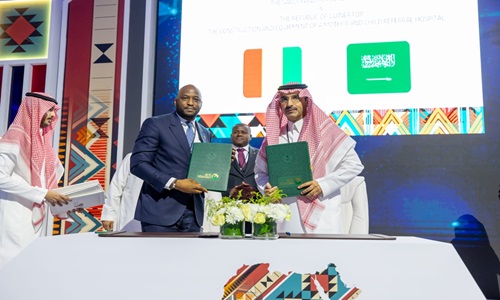Saudi Arabia grants $580m loans to African countries for key project
“We are supporting the empowerment of millions of people to reach their full potential and build a more sustainable and economically prosperous continent for future generations,”
- Advertisement -
Sultan Al-Marshal, the Chief Executive Officer, of the Saudi Fund for Development (SFD) has today signed, 14 new development loan agreements with 12 African Ministers, worth over $580 million.
The contracts is to fund projects in healthcare, water, education, and transportation sectors in Angola, Burkina Faso, Benin, Burundi, Cabo Verde, Guinea, Malawi, Mozambique, Niger, Rwanda, Sierra Leone, and Tanzania.
The signing ceremony took place at the Saudi-Arab-African Economic Conference held in Riyadh, Kingdom of Saudi Arabia.
In conjunction with the loan agreements signing, the SFD CEO also signed a Memorandum of Understanding (MoU) with the African Finance Corporation’s Chief Executive Officer, Mr. Samaila Zubairu
This MoU will enable the SFD to collaborate with AFC to identify, develop, and co-finance infrastructure and industrial projects across the continent.
The 14 development loan agreements signed today include the Construction and Equipping of a Mother and Child Referral Hospital in Guinea for $75 million, a Riyadh Referral hospital in Sierra Leone for $50 million, Boarding Secondary Schools for Girls in Several Regions of Niger for $28 million, and the Construction of Higher College For Teacher Preparation and The Scientific Secondary School Project in Benin for $40 million.
The agreements also include the Rehabilitation of the King Khalid University Hospital in Bujumbura, Burundi for $50 million, the Manga Regional Hospital (Phase 2) in Burkina Faso for $17 million, and Watersheds in the Islands of Santiago, Saint Antao, and Boavista, Cabo Verde for $17 million.
The SFD will also fund the Catumbela Industrial Development Project (Phase 1) in Angola for $100 million, the Expansion of The Transmission and Distribution Water System in the East of Kigali, Rwanda for $20 million, and the Construction and Rehabilitation of the Mangochi-Makanjira Road in Malawi for $20 million.
Other agreements include the Construction7 and Equipping of five Hospitals in different regions of Mozambique for $50 million, the Construction of the Muera Dam in Mozambique for $50 million, the Rehabilitation and Upgrade of Two parts of National Road No. 1 in Mozambique for $50 million and the Benaco to Kyaka Transmission Line Project in Tanzania for $13 million.
These agreements and the MoU will have a positive impact on the lives of millions of people in different regions across Africa by improving access to healthcare, education, water, transportation, and economic opportunities, stimulating economic growth, and creating jobs.
Importantly, the projects will address a wide range of the United Nation (UN) Sustainable Development Goals (SDGs), priorities, including poverty, health, education, gender equality, water and sanitation, decent work, economic growth, industry, innovation, infrastructure, inequality reduction, sustainable cities and communities, and climate change.
The Saudi Fund for Development CEO said: “The SFD is proud to continue in partnering with African countries through contributing and supporting development projects that will have a tangible impact on the lives of millions of people.”
He noted that with these new agreements and MoU, the SFD has taking a step further towards a brighter and more equitable Africa by contributing to healthcare, education, water, and transportation projects.
“We are supporting the empowerment of millions of people to reach their full potential and build a more sustainable and economically prosperous continent for future generations,” he added.
He said: “In line with SFD mission to promote global sustainable development since 1975, SFD has funded more than 800 development projects worth $20 billion in over 100 countries around world. In Africa alone, SFD has financed over 400 projects worth $10.7 billion in 46 countries.
This accounts for 57% of SFD’s funding in developing countries worldwide”.
source:zedmultimedia.com
- Advertisement -
- Advertisement -



